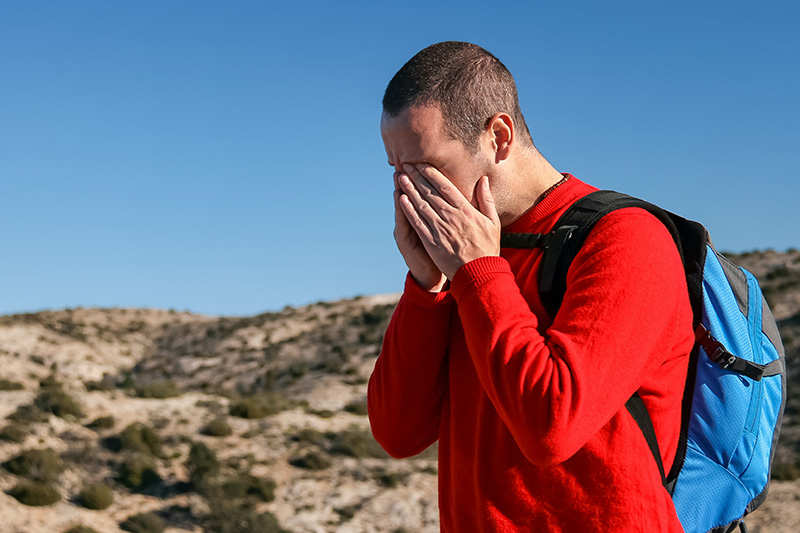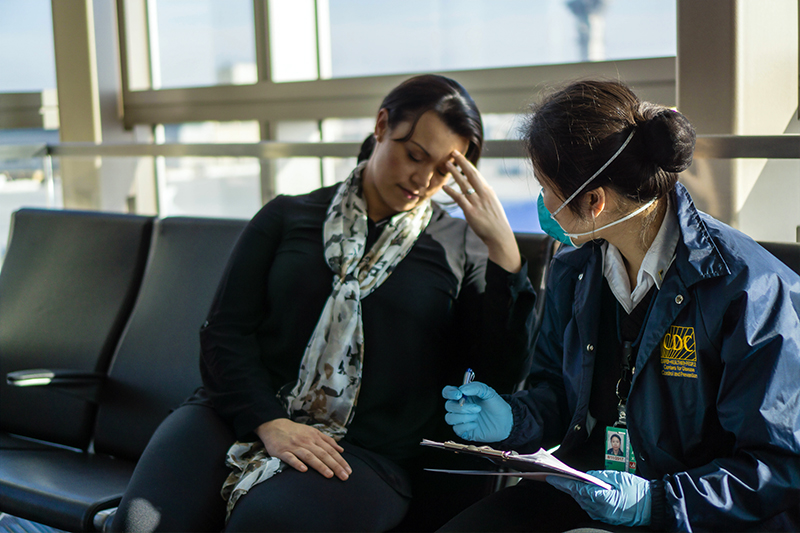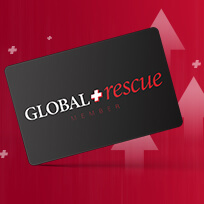From traveler’s diarrhea to an itchy rash to dental pain, we’ve all had (or heard) our fair share of travel horror stories. A recent Global Rescue survey confirms six common travel illnesses — and our experts explain how you can avoid them.
It’s not uncommon to hear a cringe-worthy travel story when chatting with a fellow traveler, while scanning Reddit Travel or during travel. Travel nightmares — from traveler’s diarrhea to dental pain to migraines — have happened to most of us. But you don’t have to suffer alone — or at all.
In the summer 2022 Travel Safety and Sentiment Survey, we asked Global Rescue members — some of the most experienced travelers in the world — what illnesses have ever happened to them during a trip? The survey confirmed six common travel illnesses, and our experts explain how you can avoid them.
Number One: Traveler’s Diarrhea
It’s no surprise to hear 60% of travelers have had a diarrhea horror story, according to the Global Rescue survey. It is the most common illness in travelers, states Johns Hopkins Medicine, and the Centers for Disease Control and Prevention confirms traveler’s diarrhea strikes 30 to 70% of travelers.
Because traveler’s diarrhea is caused by drinking water or eating food that has bacteria, viruses or parasites, your best bet is to watch what you eat and drink while on the road. Your second-best option: bring along doctor-approved medications when you travel to high-risk locations.
In general, you may want to curb your adventurous eating unless you have an iron-clad stomach.
“Spit-roasted cuy (guinea pig) is a delicacy in the Ecuadorian highlands. My brother and I ate a cuy in Quito and it was delicious,” said Adam Aronson, owner of travelhelix and a Global Rescue Safe Travel Partner. “But unless you were raised in a Quichua village, it’s perfectly normal to not want to eat a grilled guinea pig. In some parts of the world, you may find yourself less likely to take certain risks due to the quality of or access to medical care.”
Number Two: Cold and Flu Symptoms

Adults get an average of two to three colds a year. Children have six to ten colds a year, and people older than age 60 usually have one cold annually. Odds are you may suffer cold or flu symptoms during travel, like 47% of our survey respondents.
“The risk of illness is very large in a foreign country. There is a surfeit of illnesses in foreign countries not found within the United States. It is completely appropriate to ask your primary care physician for prescription medications to take with you — with instructions — just in case you are overcome with an illness,” said Ian Pierce, senior specialist in medical operations at Global Rescue.
It’s important to eat well, stay hydrated, wash your hands frequently and get enough sleep.
[Related Reading: How to Avoid Illness When Traveling]
Number Three: Vomiting
According to our survey, 22% of travelers have thrown up. Motion sickness? Flu? Food poisoning? We didn’t ask, but we can assume there are several culprits at play.
The best thing to do, once you are able, is stay hydrated. “Start by sipping a clear liquid, like bottled water or broth,” said Carlene Merola, senior specialist in medical operations at Global Rescue. “If liquids are staying down, eat bland foods, like crackers or bread.”
“A good street tactic for water-borne illness: drink a warm bottle of Coca-Cola if you find your stomach a little unsettled. Follow this up with plenty of bottled/filtered water and you may fix the problem rather easily,” Pierce said. “Please see a doctor if you are experiencing stomach illness, which includes severe diarrhea and excessive vomiting.”
Number Four: Rashes and Skin Irritations
Global Rescue members (17%) list dermatologic problems as their number four. The Centers for Disease Control and Prevention lists it as the number one traveler complaint.
“While traveling your skin is exposed to lots of new potential irritants that can cause itchiness and irritation,” said Garret DeJong, senior specialist in medical operations at Global Rescue. “Rashes can be caused by many things including viruses, bacteria, fungi, insects, plants, chemicals or medical conditions.”
Want to avoid skin issues while traveling? Here is advice from Global Rescue:
- If walking in the woods or forest, do your best to stay on trails and do not touch or eat things you are not sure are safe.
- Make sure that you wear properly fitted clothing appropriate to your planned activities. Proper clothing allows freedom of movement without pinching, binding or rubbing.
- Keep clothing as clean and dry as possible. Make sure that you change out of wet or dirty clothing as rapidly as possible.
- Use an appropriate insect spray and sunscreen to protect your skin from rashes caused by insect stings or sun exposure.
- Make sure you are up to date on all of your vaccines including measles and chickenpox (varicella-zoster), as rash is a major symptom.
- If you notice your skin red, itchy or irritated, wash it with soap and water.
- Wash any wound with clean water and soap immediately, then use an antibiotic ointment and place a bandage over the wound to prevent rashes caused by infection.
- If you have sensitive skin, bring body care products that work well for you.
“Members can call Global Rescue and our operations center can monitor symptoms and rash and provide advice on how to manage, what over-the-counter meds to use and when/where to go for an in-person evaluation,” DeJong said.
Number Five: Severe Headaches or Migraines
Why do 14% of travelers get headaches or migraines?
“Stress, lack of sleep, dehydration, pressure/altitude/climate changes, increased or decreased levels of caffeine, usage changes in alcohol and nicotine, decreased or increased exercise, motion sickness and new or different stimuli can all be contributing to getting a headache/migraine while traveling,” Merola said.

Fortunately, there are many ways to keep your head from hurting:
- Making a travel plan can help mitigate some of the stress of travel.
- Make sure you are well hydrated several days before travel and during long legs of travel.
- Try your best to get a good night’s sleep before travel.
- If you are a coffee drinker, plan to have access to caffeine or bring some with you. If you know you won’t have any on hand, take a few weeks to wean yourself off before travel. Try to avoid substituting caffeine for lack of sleep.
- Carry a water bottle with you and make sure you drink lots of water. “Drink more if you’re active, in hot climates or high-altitude environments. Dehydration is a major trigger for many people,” Merola said.
- Try not to overindulge in alcohol and sweets, which can increase your risk of getting a headache.
- Pay attention to what seems to trigger you and make a plan to avoid or reduce exposure. For example, motion sickness while being on a bumpy road or on a boat can also trigger headaches. “Bright lights or loud noise can also trigger headaches and migraines,” Merola said. “Pack sunglasses, sleep masks, earplugs and noise canceling headphones.”
It may also help to practice mindfulness.
“When travelling we are often tempted to fit every activity in during our stay,” Merola said. “Make sure to take time to relax and be in the moment. Try not to overdo any activity and space out the fun.”
Number Six: Dental Pain
Causes of dental pain can include a cavity, infection of the gums, injury to the teeth or gums, loss of a dental cap, crown, bridgework, filling or poorly fitting dentures. And 13% of survey respondents report having some type of dental pain during travel.
“Our operations center had a case in Mexico City where the member lost a dental cap. Ops was able to locate a suitable material used in Wilderness First Aid in a local pharmacy to replace lost dental caps or fillings for the member,” DeJong said. “Another member was traveling in New York City and required root canal surgery urgently. Global Rescue located a periodontist able to see him in a timely manner.”
Travel Sickness Safety Net
Before every trip, Global Rescue recommends getting a pre-travel consultation with a health professional to equip and prepare yourself with the necessary preventive measures and medications.
Then, sign up for a Global Rescue membership, which provides 24/7/365 medical advisory services. You’ll speak to an in-house Global Rescue expert on the first call if one of the common travel illnesses happens during travel.











